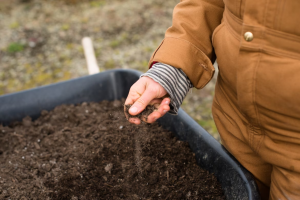Can I grow vegetables in milky spore gardens? We provided a perfect response!
Are the grubs in your vegetable garden, such as Japanese beetles, making you aggravated? There is nothing wrong with being irritated; that is how you should feel. Therefore, you might consider using the milky spore to kill the Japanese beetles that are destroying various plants in your garden. There is a catch, though!
Does milky spore pose a threat to your garden? Okay, sure. No plants or vegetables will be harmed if you use milky spore in your vegetable garden. Instead, the Japanese beetles and a few other grubs that it likes are the only things the milky spore kills.
But why do some people believe that the milky spore is harmful to a vegetable garden? What actually does it do? You might have these common queries, so we’ll explain the truth about the safety of using the milky spore in your garden.
Table of Contents
Is Milky Spore Safe for Vegetable Gardens?
Before using chemical products on the gardens of the concerned parties, we would love to show our appreciation. Verify whether any products used for particular purposes can harm the garden before using them.
Many vegetable gardeners ruin their gardens by using topical pesticides to get rid of grubs or other insects.
But we are supposed to talk about the milky spore. The Paenibacillus popilliae-based grub killer product is primarily used to eliminate grubs, such as adult Japanese beetles.
And many gardeners around the world claim that the milky spore won’t harm vegetable gardens.
However, research and public perception suggest that other insects and plants are not significantly harmed by the milky spore. As was previously mentioned, milky spore is typically produced by Paenibacillus popilliae.
You must ascertain whether the Paenibacillus popilliae is harmful to the garden and plants, whatever the case may be. If it is harmful, there is no way to use it in vegetable gardens.
Fastidious organism Paenibacillus popilliae is safe for soil and vegetable gardens. Instead, it prevents any damage to soil plants, eliminates microbial insects, and makes sure that the garden is better. The milky spore powder is not harmful to humans or animals, except for the garden.
research published in a journal by the University of New Hampshire revealed:
“Be warned that research findings indicate that the milky spore bacterium is not effective in northern New England because spring soils are too cold”
The nematode can reduce the number of white grubs, but it needs moist soil and has only shown minimal survival in New Hampshire soils due to the extreme temperature swings.
Are earthworms present in your garden, and do you find them to be beneficial? The milky spore can’t kill earthworms, so you can use it without a doubt.
Alisorganic says,
“For an organic grub control, we chose Milky Spore Powder.”
Therefore, if someone claims that the milky spore is dangerous for gardens, they are either lying or don’t know enough about the subject. Without a doubt, you can use milky spore in your vegetable garden.
Nevertheless, you should never use too much milky spore in your garden. Some people overuse it in an effort to get results quickly, but in the long run, it hurts vegetable plants.
What Should You Need To Know Before Buying Grub Killer?
Make sure you are aware of the information listed on the bottle or packet whenever you tend to purchase any products. The manufacturers should label any product that is harmful to your lawn and garden on the product itself.
Additionally, using too many chemicals or other products can harm the garden. As a result, you must also be fairly certain of it.
Most of the time, people purchase items with specific intentions but end up harming the garden. That’s not what we want you to do.
As a result, the next time you purchase any grub control product, make sure it doesn’t contain too many chemicals that could harm your garden’s plants or flowers. Less toxic grub-killing products are needed.
This May Help Before You Apply Milky Spore!
Frequently Asked Questions (FAQs)
When Should You Use Milky Spore?
When the grubs are actively feeding is when the milky spore powder should be applied. More specifically, the best seasons for milky spore powder application are spring and summer. The soil temperature stays between 60 and 80 degrees during this time, which is thought to be the ideal range for Japanese beetle eradication.
How Long Does It Take Milky Spore to Work?
The milky spore is known to function more quickly. However, you won’t see the results right away after using it on your lawn or garden. Despite starting to work right away, milky spore can take one to four years to become effective. This means that in order to completely get rid of Japanese beetles, you must constantly apply the milky spore.
Does Milky Spore Get Rid of Grubs?
Japanese beetles can be killed and controlled by the milky spore, as is well known. However, occasionally it also kills some other white grubs. However, the milky spore does not perform as well as it should when it comes to eliminating all grub species.
Conclusion
Most gardeners today don’t want to use the milky spore because it takes so long to work. Instead, they employ a variety of grub-killing products that can kill all varieties of grubs in the garden quickly.
However, this does not imply that the vegetable garden is harmed by the milky spore. Nothing else is addressed; only the Japanese beetles are. So, can vegetable gardens safely use milky spore? You must already be aware of the answer to this query.
If all your problems are with controlling Japanese beetle grubs, milky spore may come in handy. Don’t forget to use it appropriately, both in terms of timing and quantity.




